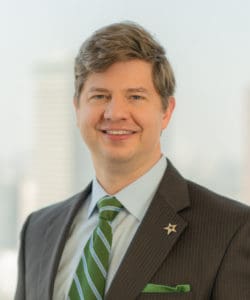Rolling power outages stemming from freezing weather conditions have paralyzed Houston and much of Texas. As of February 18th, approximately 511,000 homes and businesses are still without electricity. Earlier in the week approximately three million homes and businesses were affected. The weather and power outages have frozen construction work to a complete halt, and this lost construction time likely equates to direct and consequential damages for the construction entities.
Is this a preview of our future? Will underinvestment in infrastructure and climate change mean more power outages? Perhaps. Regardless, contractors, like homeowners, should prepare for the worst. Contractors should be aware of their force majeure language as this will determine whether they are on the hook for the damages associated with the weather and power outages.
Contracts usually address the parties’ rights and obligations in situations that are outside their control through force majeure clauses. Power outages resulting from freezing weather conditions would seemingly qualify as an Act of God and fall under such an event outside of the parties’ control. However, the deciding factor of whether this falls under the scope of a force majeure clause rests entirely on the language of the clause itself.
Texas courts interpret force majeure clauses narrowly. Gulf Oil Corp. v. Southland Royalty Co., 478 S.W.2d 583 (Tex. Civ. App. El Paso 1972). As Texas law views a force majeure clause on the specific contract language and not any traditional definition of the term, the best way to ensure a power failure would be covered would be to expressly list it in the force majeure clause.
For example:
Neither party shall be liable to the other for any delay or failure in performance due to any Act of God, power grid failure or systemic power disruption (blackouts or rolling blackouts), fire, flood, severe weather, earthquake, strike, or other labor problem not caused by the employees of either party, terrorism, war, governmental actions, civil disturbances, pandemics, epidemics, quarantines, or other health crisis.
In the event the contract does not specifically excuse performance due to power grid failure, the contractor may have to rely on the catch all provision of the event being an Act of God. Under Texas law, the contractor must demonstrate the incident, in this case rolling blackouts, was not foreseeable to the parties when they entered into the contract. TEC Olmos, LLC v. ConocoPhillips Co., 555 S.W.3d 176, 182-83 (Tex.App – Houston [1st Dist.] 2018, pet. denied).
If the event was not foreseeable, the contractor is in a strong position to shield itself from liability. If the event was foreseeable and not enumerated in the force majeure clause, the contractor will likely find itself exposed.

Francis is a native Houstonian with proven courtroom experience in both civil and criminal courts. Francis routinely represents general contractors, subcontractors, manufacturers, developers, insurance companies, owners and individuals in complex litigation, insurance defense, and worksite accidents. Known for his “straight talk” communication style, Francis is a strategic legal advisor to his clients that prioritizes their business objectives.
Francis has drafted and successfully argued countless motions and taken numerous depositions. He has also obtained successful trial verdicts for his clients, both as a first chair and second chair attorney.